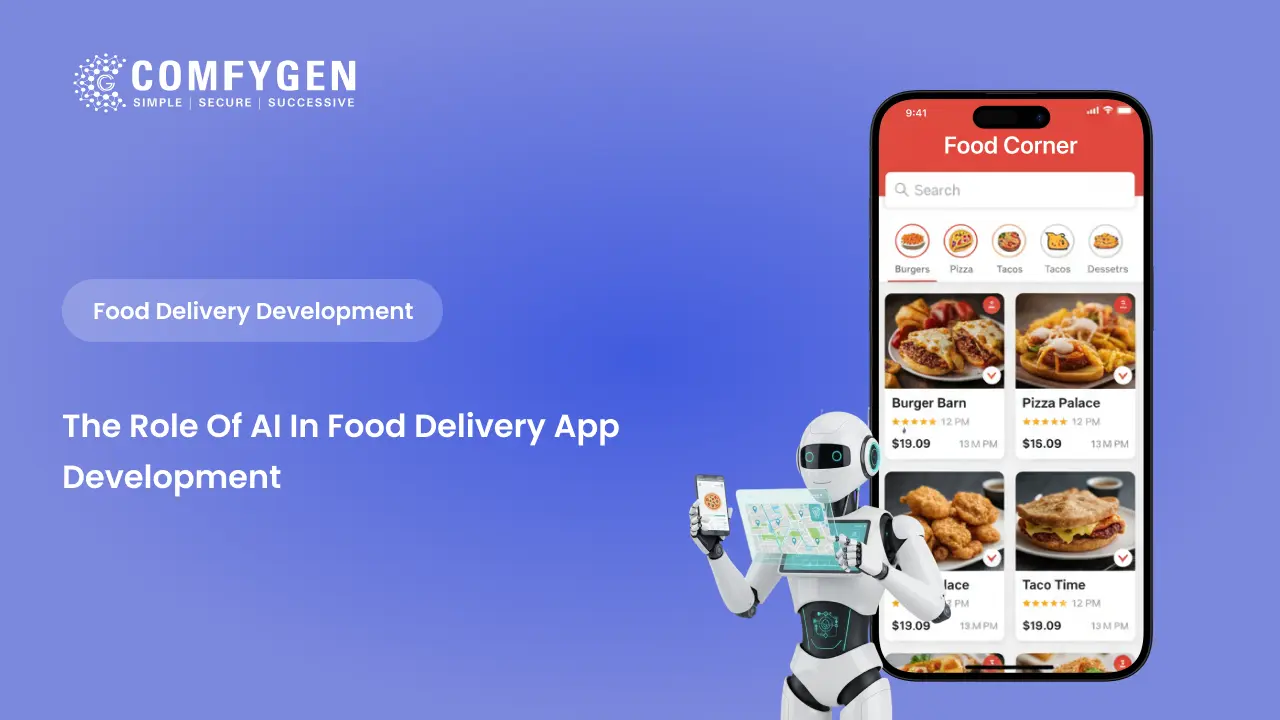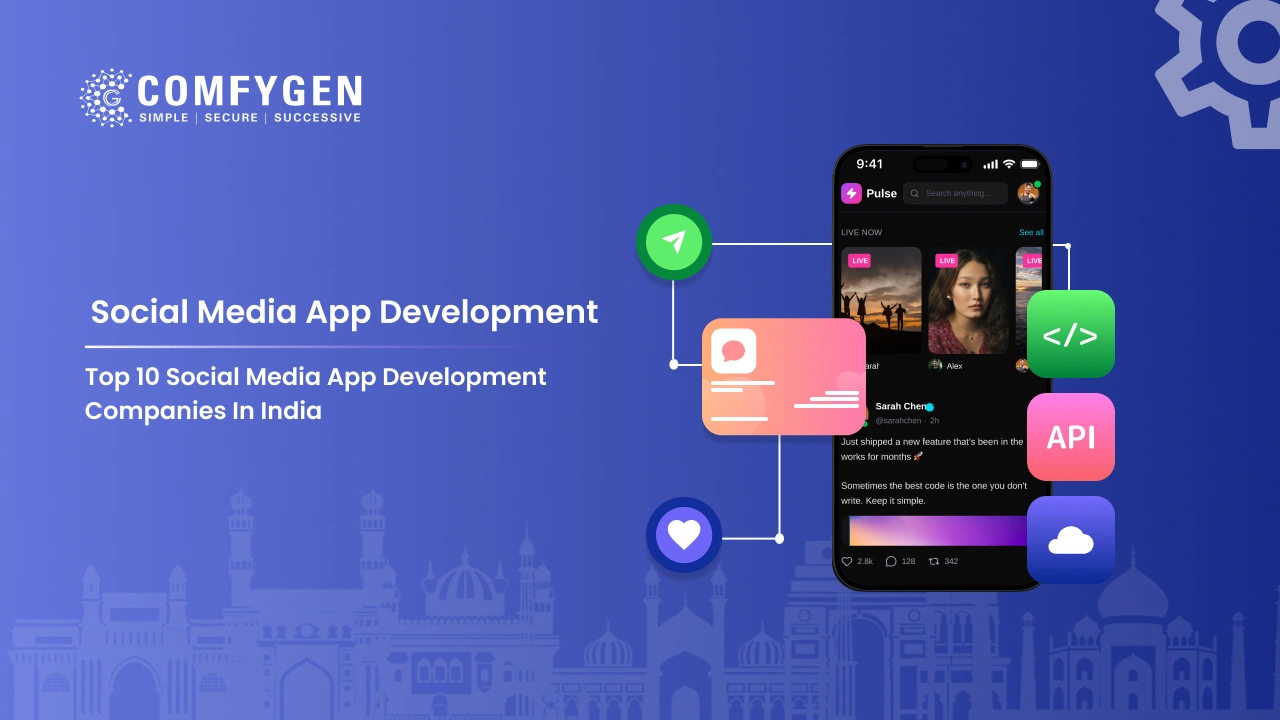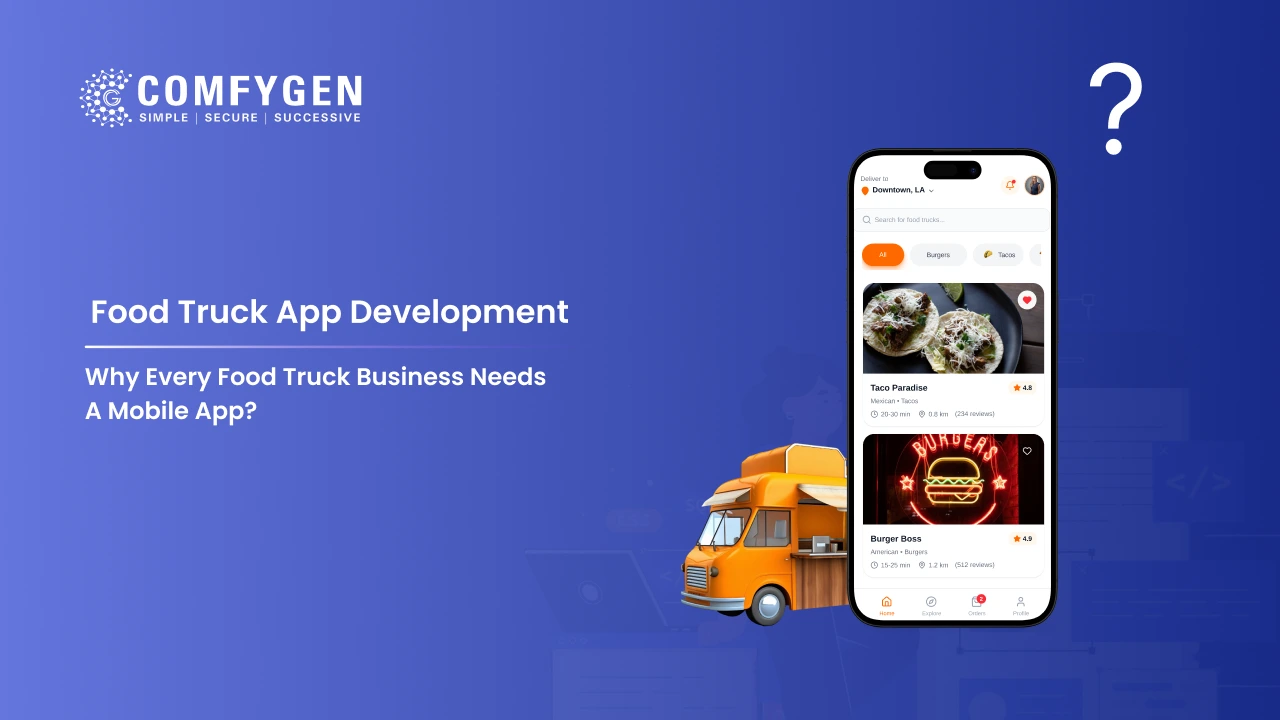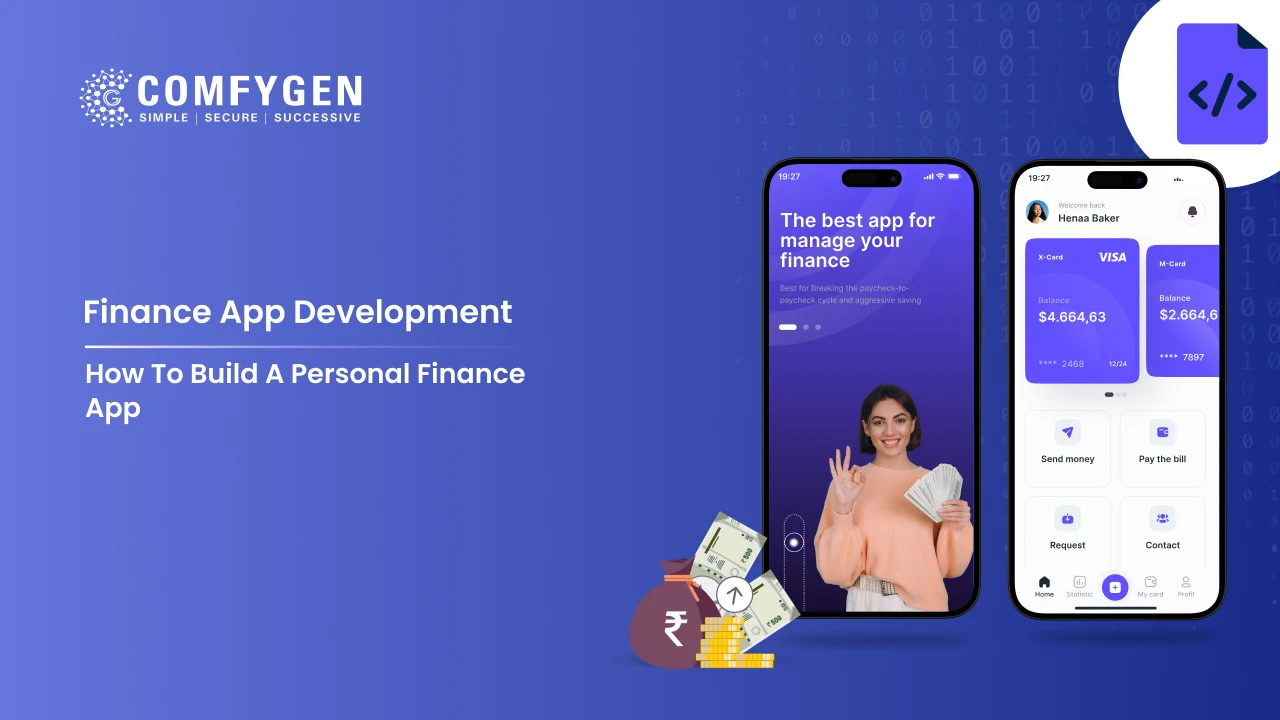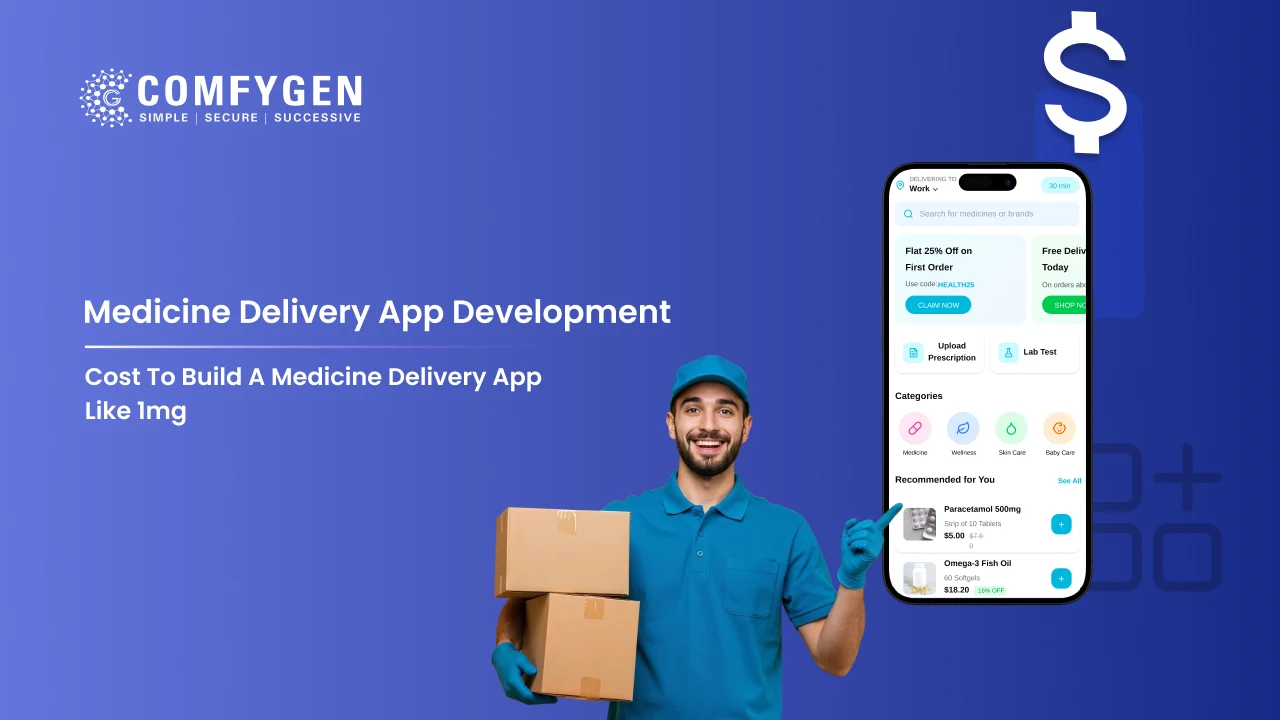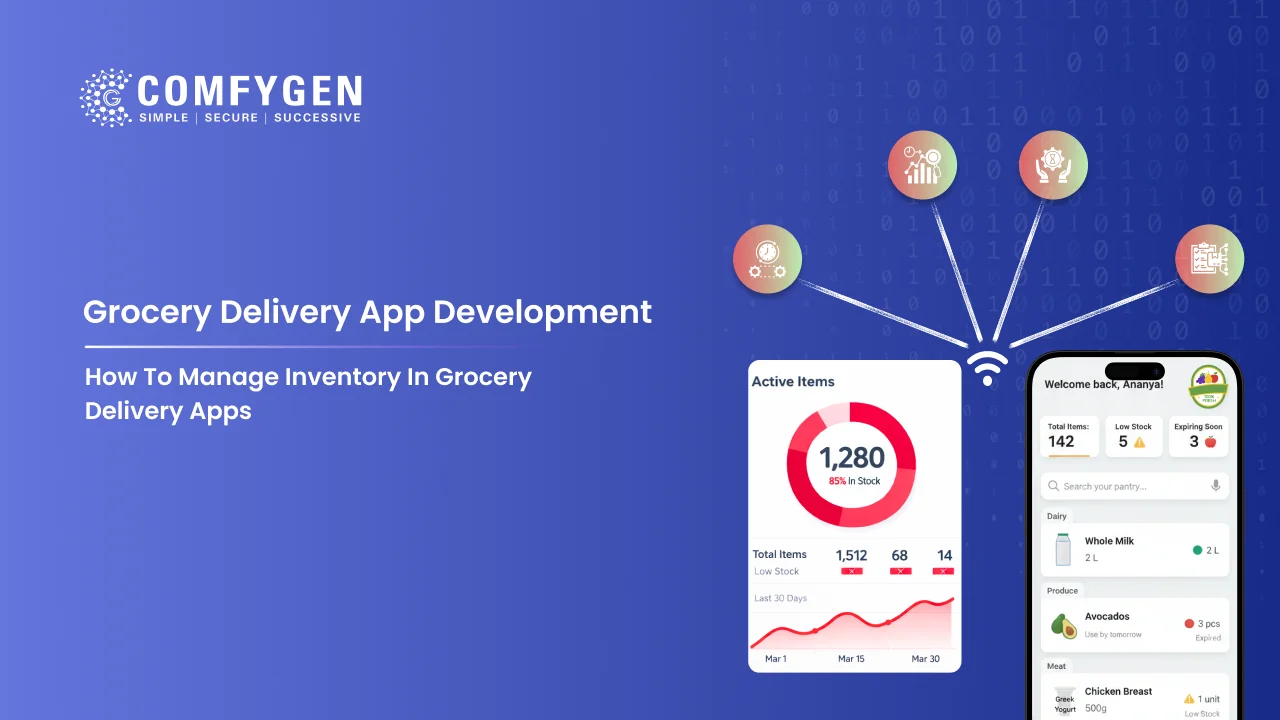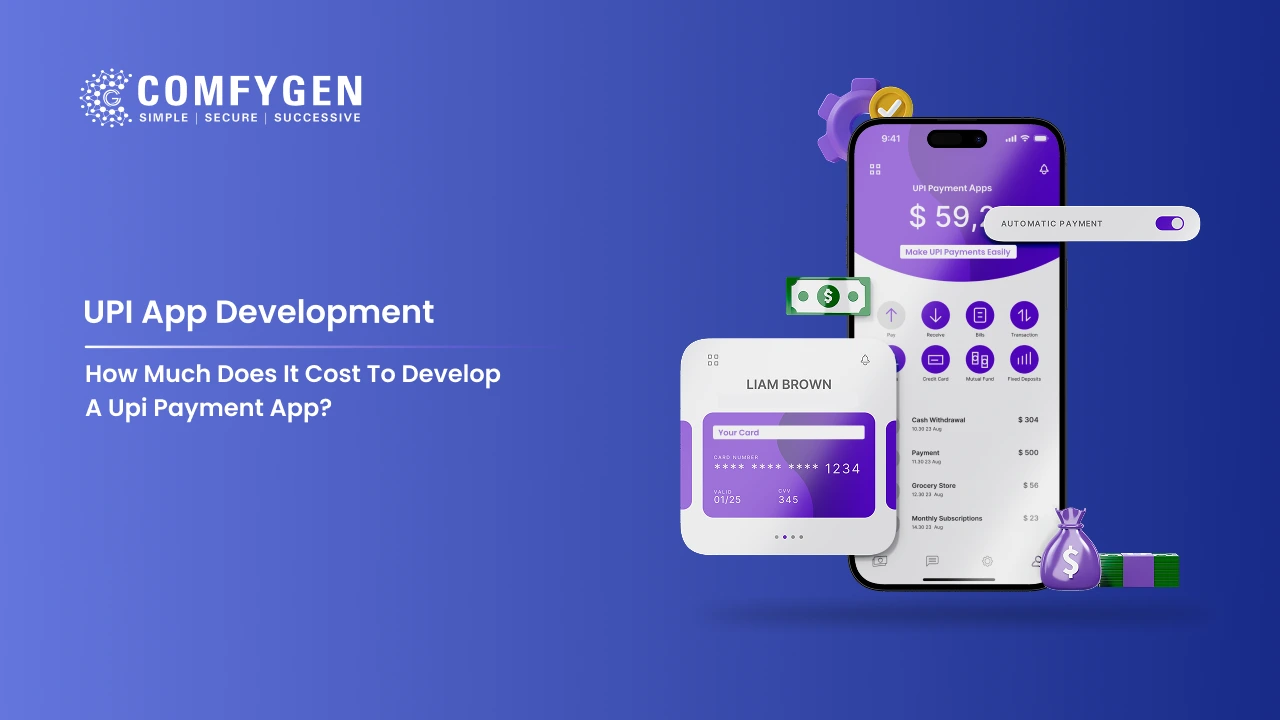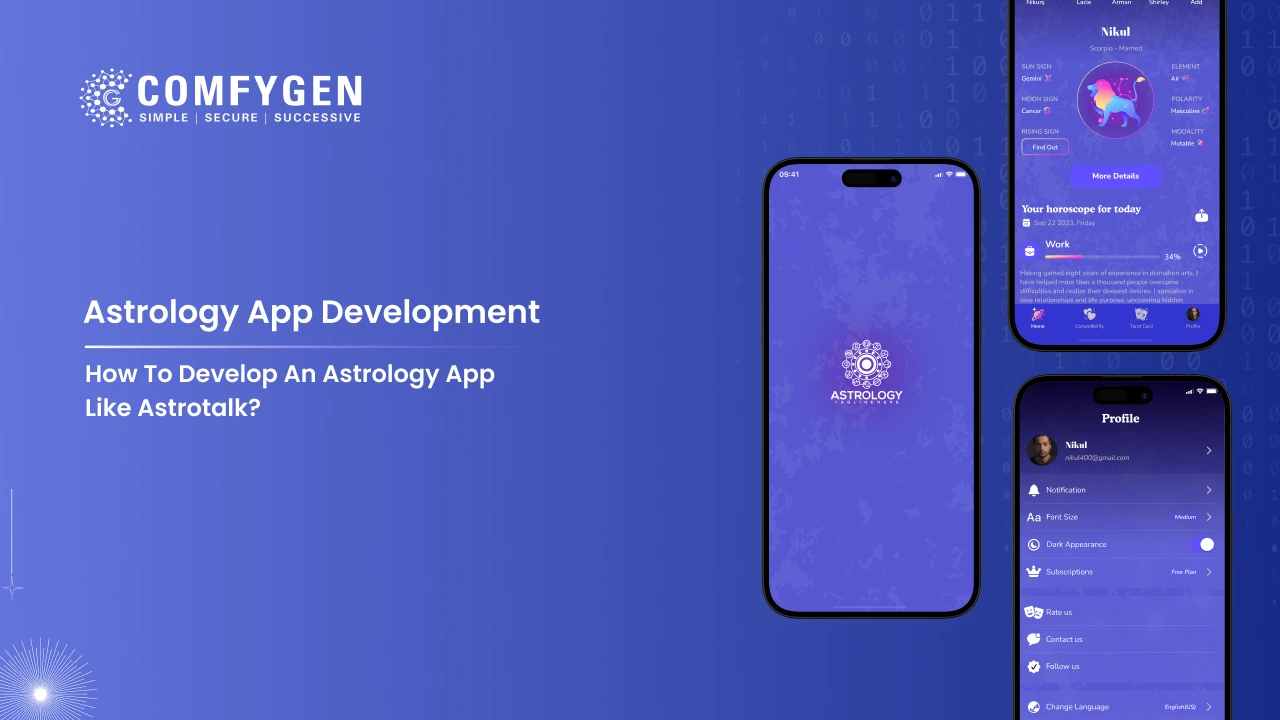The Role of AI in Food Delivery App development
food delivery app development have completely changed the way we eat. Now, all we need is our smartphones to access restaurants, cafes, and kitchens. Companies like Zomato, Swiggy, and Uber Eats have literally made “food at your fingertips” a reality. But with rising customer expectations, fierce competition, and demand for personalization, traditional app models are no longer enough.
This is where Artificial Intelligence (AI) comes in. From predicting user behavior to optimizing real-time deliveries, AI has become the backbone of successful food delivery platforms. As a leading food delivery app development company, comfygentTechnologies specializes in designing AI-powered, automation-driven, and user-friendly solutions that help startups and enterprises stay competitive.
In this blog, we will take a deeper look at the role of AI in food delivery app development, discuss real case-studies of brands that are using AI, and show how Comfygen Technologies is shaping the future of smart food delivery applications.
Understanding AI in Food Delivery Apps
Artificial Intelligence (AI) is no longer a concept of the future but has become a vital part of the food delivery industry today. If you are a startup or an enterprise working with a food delivery app development company like Comfygen Technologies, AI can convert your app from a simple ordering platform to a smart and intelligent app.
What Does AI Mean in Food Delivery Apps?
AI is basically using algorithms, machine learning (ML), and predictive analytics to make food delivery apps more intelligent and personalized.
Instead of just being a digital ordering platform, an AI-powered food delivery app can:
- Learn from user behavior (past orders, preferences, time of day).
- Predict future needs (which dish a customer may order next weekend).
- Automate workflows (assigning delivery partners instantly, updating ETA in real-time).
In short, AI makes apps more intelligent, adaptive, and customer-focused.
Why AI is Different from Automation
Many businesses confuse AI with automation, but both play different roles in food delivery apps:
- Automation → Performs predefined tasks, like sending an order confirmation SMS.
- AI → Learns and improves over time, like recommending a new dish based on your past orders and current weather.
When both are combined, the app becomes AI-friendly and highly efficient, offering smooth experiences for users, restaurants, and delivery partners.
Importance of AI in Food Delivery App Development
The food delivery market is highly competitive, where giants like Zomato, Swiggy, Uber Eats, and DoorDash are already using AI. Hence, integrating AI has become a must for startups and businesses.
Here’s why AI matters:
- Customer Satisfaction – Personalized recommendations keep users engaged.
- Efficiency – Smart route optimization reduces delivery delays.
- Cost Savings – Predictive demand helps restaurants avoid food waste.
- Scalability – Apps can handle more users and orders without increasing manual work.
- Security – AI algorithms detect fraud in real-time during digital payments.
Key Roles of AI in Food Delivery App Development
Artificial Intelligence (AI) has become the secret ingredient of food delivery apps today that makes them smart, fast, and customer-centric. With a food delivery app development company like Comfygen Technologies, AI is used not just for automation but to build intelligent systems that learn, adapt, and evolve over time.
Here are the key roles of AI in food delivery app development:
1. Personalized Customer Experience
AI makes food or restaurant recommendations by analyzing a customer’s order history, browsing behavior, favorite dishes, and time of day.
- Example: If a user frequently orders Chinese food on Friday evenings, the app highlights top Chinese restaurant deals at that time.
- Benefit: Improves customer satisfaction and boosts repeat orders.
2. Smart Order & Inventory Management.
AI for restaurants predicts demand based on past data, weather, and local events. This prevents overstocking of popular dishes and reduces food waste.
- Example: During cricket matches in India, AI predicts a spike in pizza and fast-food orders.
- Benefit: Saves cost, reduces wastage, and ensures customer orders are always fulfilled.
3. Delivery & Logistics Optimization
AI uses real-time traffic, weather updates, and delivery partner availability to assign the fastest and most efficient route.
- Example: Uber Eats uses AI to optimize delivery routes, reducing wait times for customers.
- Benefit: Faster deliveries, accurate ETA, reduced fuel costs.
4. AI in Payments & Fraud Detection
AI algorithms detect unusual payment behaviors and prevent fraudulent activities.
- Example: If multiple high-value orders are placed with the same card in a short time, the system flags it for review.
- Benefit: Builds trust with customers and ensures secure transactions.
5. Chatbots, Voice & Visual Ordering
- Chatbots: Answer customer queries instantly (order status, refund, delivery updates).
- Voice Ordering: Customers can place orders via Alexa, Siri, or Google Assistant.
- Visual Ordering: AI allows users to upload a picture of food, and the app suggests where to order it.
- Benefit: Enhances customer convenience and engagement.
6. Customer Retention & Engagement
AI uses predictive analytics to identify when a customer might stop ordering and sends personalized offers or loyalty rewards to re-engage them.
- Example: Swiggy sends custom coupons if a user hasn’t ordered in a while.
- Benefit: Increases retention rates and reduces churn.
7. Dynamic Pricing & Demand Forecasting
AI adjusts pricing during peak hours or high demand (surge pricing). It also predicts future demand trends based on historical data.
- Example: Uber Eats increases delivery fees during rainy evenings when order volumes spike.
- Benefit: Maximizes revenue and balances demand.
Real Case Studies: How Leading Food Apps Use AI
Artificial Intelligence has already reshaped the global food delivery market. Leading players like Yelp, Uber Eats, Swiggy, Zomato, and Samsung’s Food AI are prime examples of how AI can improve user experience, logistics, and business growth. Let’s explore these case studies in detail:
1. Yelp – AI for Smart Reviews and Recommendations
-
- Problem: With millions of customer reviews, filtering authentic and useful ones was a challenge.
- AI Solution: Yelp uses Natural Language Processing (NLP) and Machine Learning algorithms to analyze customer reviews, detect fake or spam content, and highlight genuine feedback.
- Problem: With millions of customer reviews, filtering authentic and useful ones was a challenge.
- Impact:
-
- Personalized restaurant recommendations based on sentiment analysis.
- Improved trust and engagement among users.
- Personalized restaurant recommendations based on sentiment analysis.
- Takeaway for Businesses: AI-driven review analysis builds credibility and ensures customers get relevant, authentic information.
2. Food AI by Samsung – Personalized Diet & Smart Cooking
- Problem: Modern consumers want not only convenience but also health-focused food choices.
- AI Solution: Samsung’s Food AI integrates with smart appliances and apps to:
- Suggest personalized recipes based on dietary needs and preferences.
- Track calorie intake and nutritional values.
- Recommend healthier alternatives.
- Suggest personalized recipes based on dietary needs and preferences.
- Impact:
- Merges food delivery with health & wellness.
- Encourages mindful eating through AI insights.
- Merges food delivery with health & wellness.
- Takeaway for Businesses: Future-ready apps can differentiate themselves by integrating AI-based health and lifestyle features.
3. Uber Eats – AI for Demand Forecasting & Route Optimization
- Problem: High delivery demand during peak hours caused delays and customer dissatisfaction.
- AI Solution: Uber Eats applies AI-powered predictive analytics to:
- Anticipate demand surges (e.g., lunch hours, weekends, rainy days).
- Optimize driver routes using real-time traffic and weather data.
- Implement dynamic pricing during peak demand.
- Anticipate demand surges (e.g., lunch hours, weekends, rainy days).
- Impact:
- Reduced delivery times.
- Increased driver efficiency.
- Higher customer satisfaction.
- Reduced delivery times.
- Takeaway for Businesses: Predictive AI ensures faster delivery and smarter operations, which boosts customer trust.
4. Swiggy – AI for Predictive ETAs & Smart Logistics
-
- Problem: Customers demanded accurate Estimated Time of Arrival (ETA) and faster deliveries.
- AI Solution: Swiggy uses machine learning algorithms to:
- Accurately calculate delivery times based on restaurant preparation, distance, and traffic conditions.
- Smartly assign delivery partners to reduce idle time.
- Offer personalized food recommendations to customers.
- Accurately calculate delivery times based on restaurant preparation, distance, and traffic conditions.
- Problem: Customers demanded accurate Estimated Time of Arrival (ETA) and faster deliveries.
- Impact:
-
- Highly accurate ETAs improved customer trust.
- Faster and more efficient delivery operations.
- Highly accurate ETAs improved customer trust.
- Takeaway for Businesses: AI in logistics optimization directly improves customer experience and retention.
5. Zomato – AI for Food Image Recognition & Smart Search
- Problem: Users struggled to search and discover new food items.
- AI Solution: Zomato implemented:
- Food image recognition – Users upload a dish photo, and AI identifies similar dishes from nearby restaurants.
- AI-driven search optimization for personalized recommendations.
- AI models for hyperlocal targeting of discounts and offers.
- Food image recognition – Users upload a dish photo, and AI identifies similar dishes from nearby restaurants.
- Impact:
- Increased customer engagement and app usage.
- Enhanced discovery of restaurants and cuisines.
- Increased customer engagement and app usage.
- Takeaway for Businesses: AI features like visual search and personalized targeting help apps stand out in competitive markets.
Key Lessons from These Case Studies
- Yelp: AI builds trust by ensuring authentic reviews.
- Samsung Food AI: AI enhances lifestyle by merging food with health.
- Uber Eats: AI reduces delays through forecasting & dynamic pricing.
- Swiggy: AI strengthens logistics and accuracy in deliveries.
- Zomato: AI boosts discovery with food image recognition & smart search.
These examples show that AI is not just an add-on—it is the core of every successful Food Delivery App Development Company.
How Comfygen Technologies Integrates AI in Food Delivery App Development
At Comfygen Technologies, we believe that building a food delivery app isn’t just about connecting restaurants with customers—it’s about creating a smart, AI-powered ecosystem that delivers personalization, automation, and real-time intelligence at every stage of the process.
Here’s how we integrate Artificial Intelligence (AI) into food delivery app development:
1. AI-Powered Recommendation Engine:
We build algorithms that personalize food suggestions based on user data.
2. Real-Time Tracking with Predictive Analytics:
Delivery times are optimized with live traffic and demand analysis.
3. AI Chatbots & Multilingual Voice Assistants:
Seamless support with conversational AI for global audiences.
4. Data-Driven Inventory & Order Management:
Restaurants receive real-time stock insights and demand forecasts.
5. Scalable Automation Solutions:
From auto-dispatching orders to AI-driven driver allocation, we ensure smooth operations.
Benefits of AI-Powered Food Delivery Apps
Artificial Intelligence (AI) has become a necessity for food delivery apps, not a luxury. AI apps are designed to be smart, personalized, and efficient. Let’s see what the benefits are for every stakeholder:
1. Benefits for Customers
AI makes food ordering faster, smarter, and more personalized for customers.
- Personalized recommendations: AI suggests dishes based on your past orders and browsing history.
- Example: If a user orders noodles on a weekend, the app will automatically show noodles deals on Friday.
- Smart search and visual recognition: Find food using voice search and images.
- Real-time ETA: AI estimates accurate delivery times (depending on traffic/weather).
- 24/7 chatbot: Instant support for order tracking and queries.
- Diet suggestions: AI can also recommend healthy or allergen-free food options.
2. Benefits for Restaurants & Food Partners
Restaurants gain predictive insights and operational efficiency with AI-enabled platforms.
- Smart Inventory Management: AI predicts demand for popular dishes, helping reduce food wastage.
- Dynamic Menu Pricing: Prices can adjust based on demand, seasonality, or time of day.
- Improved Customer Insights: Restaurants can identify loyal customers and target them with personalized deals.
- Efficient Order Processing: Automation reduces kitchen errors by analyzing patterns and streamlining order flow.
- Revenue Growth: With better targeting and customer engagement, restaurants experience higher order volumes.
Result: More profit, less waste, and efficient business operations.
3. Benefits for Delivery Partners
AI doesn’t just help businesses and customers; it also improves the lives of delivery executives.
- Optimized Routes: AI maps out the fastest delivery routes considering real-time traffic and weather.
- Balanced Workload: Orders are assigned fairly to avoid overburdening some delivery partners.
- Predictive Earnings Insights: AI shows delivery agents peak demand hours so they can plan shifts better.
- Reduced Idle Time: Smarter order allocation reduces waiting time between deliveries.
Result: Delivery agents save time, earn more, and face fewer hassles.
4. Benefits for Business Owners & Investors
For entrepreneurs and enterprises, AI is the key to scalability and competitive advantage.
- Cost Reduction: AI automation reduces dependency on manual operations.
- Scalability: Easily manage thousands of restaurants and delivery partners with AI-driven systems.
- Fraud Prevention: AI detects fake accounts, suspicious payments, and fraudulent transactions.
- Improved ROI: Personalized marketing campaigns powered by AI drive higher customer retention.
- Competitive Edge: Businesses with AI-friendly apps can compete with giants like Zomato, Swiggy, and Uber Eats.
Result: Sustainable growth, higher profits, and strong market positioning.
5. How Comfygen Technologies Delivers These Benefits
As a top Food Delivery App Development Company, Comfygen Technologies builds AI-powered, automation-friendly apps that combine all these benefits into one solution.
- Personalized customer journeys.
- Smart inventory & order management for restaurants.
- Route optimization for delivery partners.
- Predictive analytics for business owners.
- Strong AI modules ensure security, scalability, and efficiency.
With Comfygen Technologies, businesses don’t just get an app—they get an AI-driven ecosystem built for long-term success.
Challenges in AI Integration & How to Overcome Them
While AI brings great opportunities, challenges remain:
- Data Privacy: Handling user data securely.
- Development Costs: AI models require more investment.
- Continuous Model Training: AI must evolve with changing user behavior.
- Regulatory Compliance: Meeting food & data safety laws.
Comfygen Technologies overcomes these challenges with robust security, cloud-based infrastructure, and modular AI integration that ensures smooth performance.
Future of AI in Food Delivery App Development
Artificial Intelligence (AI) has already disrupted the food delivery industry, through personalization, logistics optimization, and automation. But the future of AI in food delivery app development looks even more transformative, bringing innovation to customers, restaurants, delivery partners, and business owners.
Here’s how the future is shaping up:
1. Generative AI for Personalized Ordering
- Future food delivery apps will go beyond simple recommendations.
- Generative AI will design entire meal plans based on dietary needs, preferences, and health goals.
- For example: A customer who wants “low-calorie Indian dinner options” could instantly get curated suggestions.
2. Drone & Robot Deliveries Powered by AI Navigation
- Companies are already experimenting with AI-enabled autonomous deliveries.
- Drones and robots, guided by AI, will deliver food faster and reduce human dependency.
- This will improve efficiency in crowded cities and remote areas.
3. Predictive Health & Nutrition Recommendations
- Future AI systems will not just deliver food—they’ll recommend meals based on health data.
- Integration with wearable devices (like smartwatches) will allow apps to suggest healthier options.
- Example: If your smartwatch records high sugar levels, the app may recommend diabetic-friendly dishes.
4. Hyperlocal AI Marketing
- AI will analyze real-time user location and behavior to send hyperlocal deals.
- Example: A user walking near a pizza restaurant may get a push notification with a discount.
- This creates personalized engagement and higher conversion rates.
5. Voice & Visual Ordering Becomes Standard
- Future food delivery apps will rely heavily on voice assistants like Alexa or Google Assistant.
- Customers will simply say: “Order my regular dinner from Subway,” and AI will handle the rest.
- Visual search will allow customers to upload a food photo and instantly find similar dishes.
6. AI-Driven Sustainability & Waste Reduction
- AI will help restaurants predict demand more accurately, reducing food waste.
- It will also optimize delivery routes to cut fuel usage and carbon emissions, making apps more eco-friendly.
7. Real-Time Multi-Language Chatbots
- AI-powered chatbots will handle customer queries in multiple languages instantly.
- This will help food delivery platforms expand globally and serve a diverse customer base.
8. Integration of Blockchain + AI for Security
- Future AI systems will work alongside blockchain to secure payments and user data.
- Fraud detection and safe transactions will become even stronger with AI-blockchain hybrid models.
Final Outlook
The future of AI in food delivery app development will focus on intelligence, convenience, and personalization. Customers will not just get food, but enjoy a smart dining experience that suits their lifestyle.
Reliable food delivery app development company like comfygen technologies will make these AI-powered innovations accessible to startups and enterprises. By integrating generative AI, robotics, health analytics, and hyperlocal marketing, Comfygen keeps businesses always one step ahead in the digital food ecosystem.
Why Choose Comfygen Technologies as Your Food Delivery App Development Company?
Building a food delivery app in today’s competitive digital world is not just a matter of coding – it requires strategic planning, AI integration, effortless UX, and robust backend systems. This is why businesses prefer Comfygen Technologies as a leading food delivery app development company.
See why:
- Expertise in AI-Powered Solutions
- End-to-End Development Services
- Scalable & Future-Ready Apps
- Data Security & Compliance
- Proven Track Record & Industry Knowledge
- Custom Solutions Tailored to Your Needs
- Ongoing Support & Maintenance
Conclusion
AI is making the food delivery industry smarter, faster, and personalized. From predictive recommendations to optimized delivery routes, AI enhances the customer experience and makes restaurant and delivery partner operations efficient. Businesses that integrate AI gain a competitive edge, improved operational efficiency, and higher customer satisfaction.
Comfygen Technologies specializes in building AI-powered and automation-driven food delivery apps that are perfect for today’s dynamic market. Partnering with us will make your app future-ready, user-friendly, and scalable, such that startups and enterprises can compete effectively with industry leaders like Zomato, Swiggy, and Uber Eats.
FAQs
What are the top AI features in a food delivery app?
Which apps already use AI?
How much does it cost to build an AI-enabled food delivery app?
Why should startups invest in AI?
Why choose Comfygen Technologies?

Mr. Saddam Husen, (CTO)
Mr. Saddam Husen, CTO at Comfygen, is a renowned Blockchain expert and IT consultant with extensive experience in blockchain development, crypto wallets, DeFi, ICOs, and smart contracts. Passionate about digital transformation, he helps businesses harness blockchain technology’s potential, driving innovation and enhancing IT infrastructure for global success.

